SM 302: Strategic Management and Leadership Analysis of Qantas Airways
VerifiedAdded on 2022/09/29
|11
|3113
|34
Report
AI Summary
This report provides a comprehensive analysis of Qantas Airways' strategic management and leadership. It examines the airline's corporate social responsibility initiatives, including its commitment to environmental sustainability through biofuel partnerships and carbon offsetting, and its adherence to ethical standards. The report details Qantas's stakeholder communication strategies, emphasizing transparency and effective management of internal and external stakeholders, including employees, suppliers, shareholders, and government entities. It further explores Qantas's brand-building efforts, focusing on transparency, digital presence, and emotional marketing through its website and social media platforms. The report also discusses the challenges Qantas has faced, such as staff cuts and route eliminations, and how it has responded by launching Jetstar and strengthening its risk management policies. Finally, the report analyzes the macro-environmental forces impacting Qantas, using a PESTLE analysis to assess political, economic, social, technological, legal, and environmental factors influencing its profitability and strategic decisions. The report also explores the importance of building a strong digital presence and fostering a strong emotional connection with its customers.
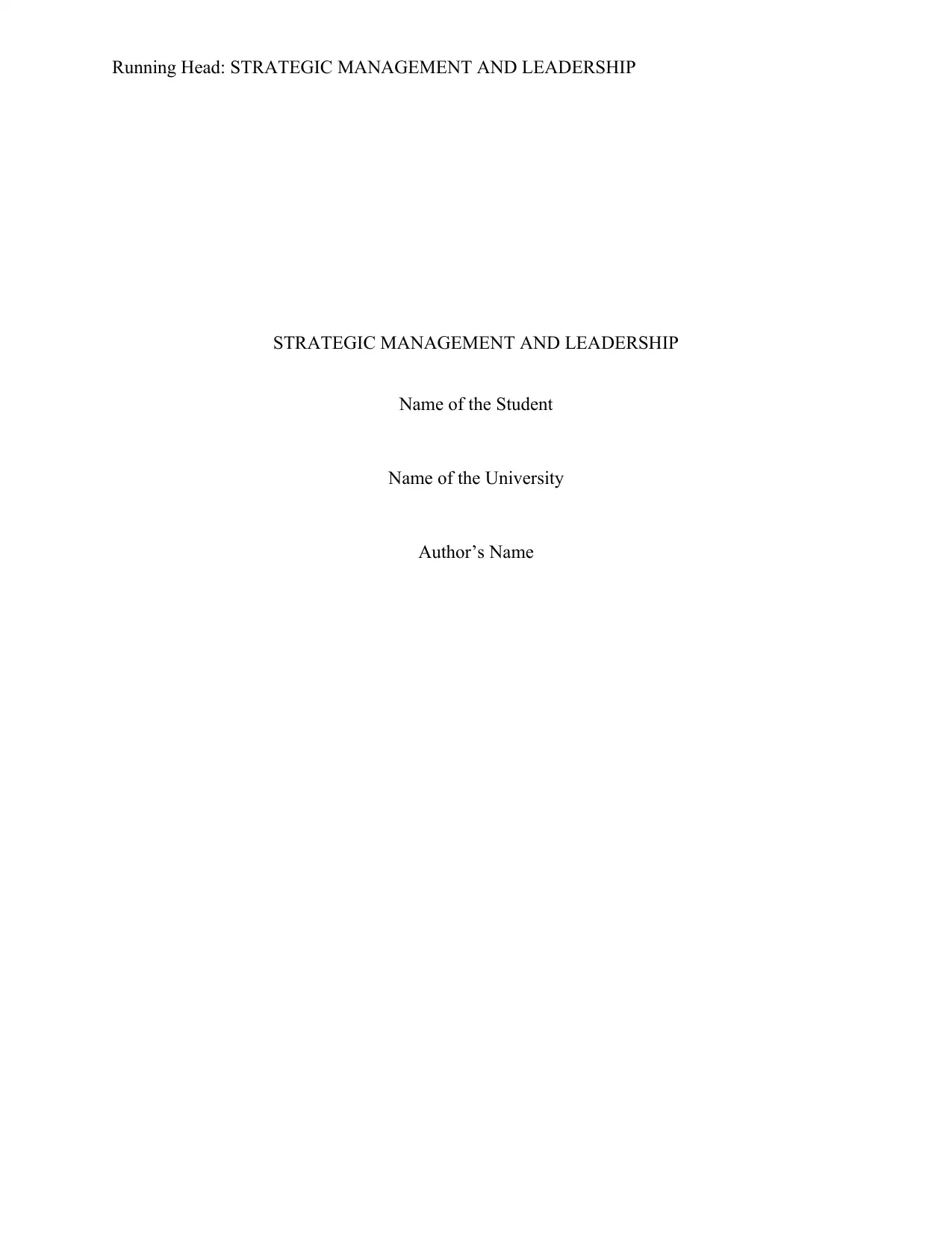
Running Head: STRATEGIC MANAGEMENT AND LEADERSHIP
STRATEGIC MANAGEMENT AND LEADERSHIP
Name of the Student
Name of the University
Author’s Name
STRATEGIC MANAGEMENT AND LEADERSHIP
Name of the Student
Name of the University
Author’s Name
Paraphrase This Document
Need a fresh take? Get an instant paraphrase of this document with our AI Paraphraser
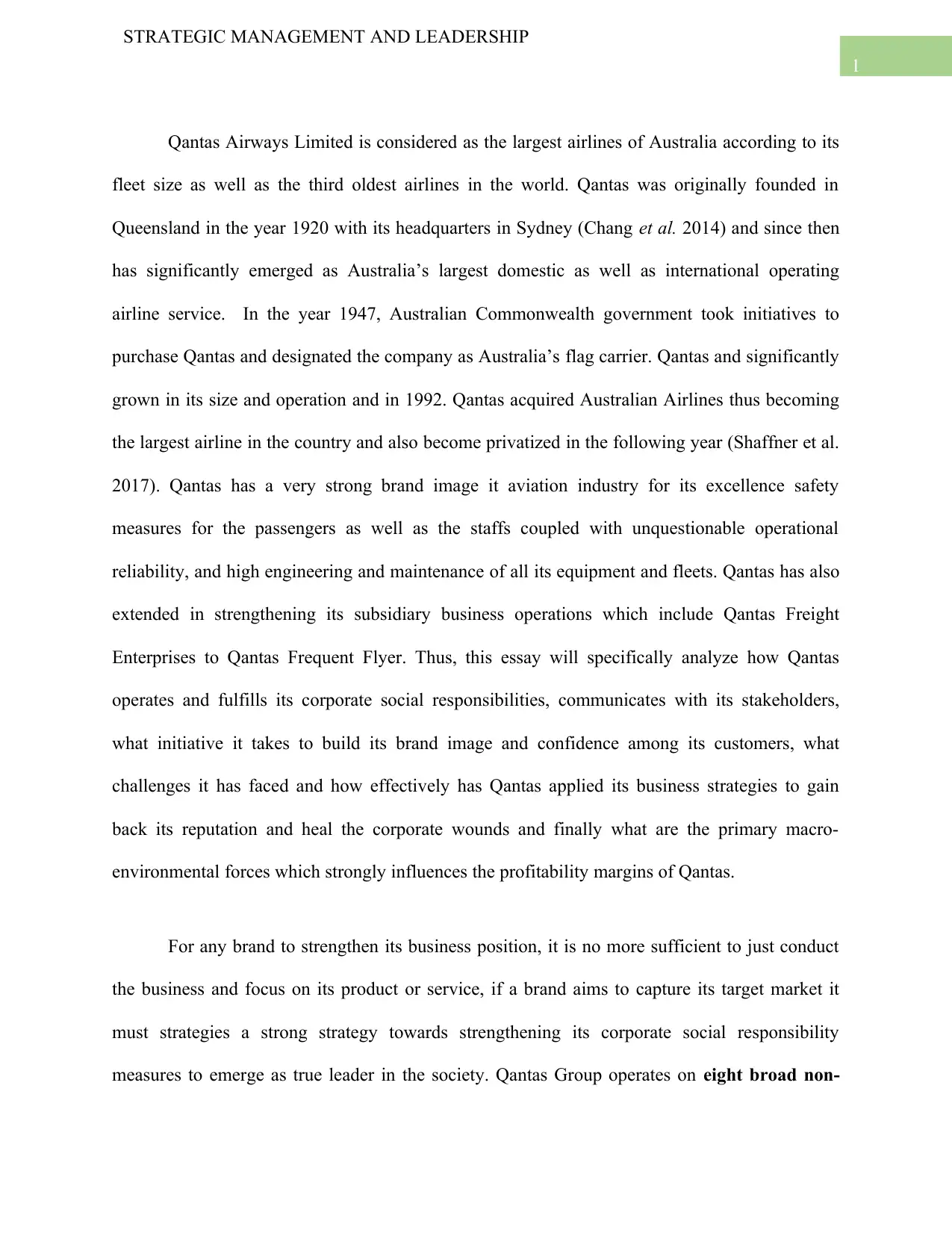
1
STRATEGIC MANAGEMENT AND LEADERSHIP
Qantas Airways Limited is considered as the largest airlines of Australia according to its
fleet size as well as the third oldest airlines in the world. Qantas was originally founded in
Queensland in the year 1920 with its headquarters in Sydney (Chang et al. 2014) and since then
has significantly emerged as Australia’s largest domestic as well as international operating
airline service. In the year 1947, Australian Commonwealth government took initiatives to
purchase Qantas and designated the company as Australia’s flag carrier. Qantas and significantly
grown in its size and operation and in 1992. Qantas acquired Australian Airlines thus becoming
the largest airline in the country and also become privatized in the following year (Shaffner et al.
2017). Qantas has a very strong brand image it aviation industry for its excellence safety
measures for the passengers as well as the staffs coupled with unquestionable operational
reliability, and high engineering and maintenance of all its equipment and fleets. Qantas has also
extended in strengthening its subsidiary business operations which include Qantas Freight
Enterprises to Qantas Frequent Flyer. Thus, this essay will specifically analyze how Qantas
operates and fulfills its corporate social responsibilities, communicates with its stakeholders,
what initiative it takes to build its brand image and confidence among its customers, what
challenges it has faced and how effectively has Qantas applied its business strategies to gain
back its reputation and heal the corporate wounds and finally what are the primary macro-
environmental forces which strongly influences the profitability margins of Qantas.
For any brand to strengthen its business position, it is no more sufficient to just conduct
the business and focus on its product or service, if a brand aims to capture its target market it
must strategies a strong strategy towards strengthening its corporate social responsibility
measures to emerge as true leader in the society. Qantas Group operates on eight broad non-
STRATEGIC MANAGEMENT AND LEADERSHIP
Qantas Airways Limited is considered as the largest airlines of Australia according to its
fleet size as well as the third oldest airlines in the world. Qantas was originally founded in
Queensland in the year 1920 with its headquarters in Sydney (Chang et al. 2014) and since then
has significantly emerged as Australia’s largest domestic as well as international operating
airline service. In the year 1947, Australian Commonwealth government took initiatives to
purchase Qantas and designated the company as Australia’s flag carrier. Qantas and significantly
grown in its size and operation and in 1992. Qantas acquired Australian Airlines thus becoming
the largest airline in the country and also become privatized in the following year (Shaffner et al.
2017). Qantas has a very strong brand image it aviation industry for its excellence safety
measures for the passengers as well as the staffs coupled with unquestionable operational
reliability, and high engineering and maintenance of all its equipment and fleets. Qantas has also
extended in strengthening its subsidiary business operations which include Qantas Freight
Enterprises to Qantas Frequent Flyer. Thus, this essay will specifically analyze how Qantas
operates and fulfills its corporate social responsibilities, communicates with its stakeholders,
what initiative it takes to build its brand image and confidence among its customers, what
challenges it has faced and how effectively has Qantas applied its business strategies to gain
back its reputation and heal the corporate wounds and finally what are the primary macro-
environmental forces which strongly influences the profitability margins of Qantas.
For any brand to strengthen its business position, it is no more sufficient to just conduct
the business and focus on its product or service, if a brand aims to capture its target market it
must strategies a strong strategy towards strengthening its corporate social responsibility
measures to emerge as true leader in the society. Qantas Group operates on eight broad non-
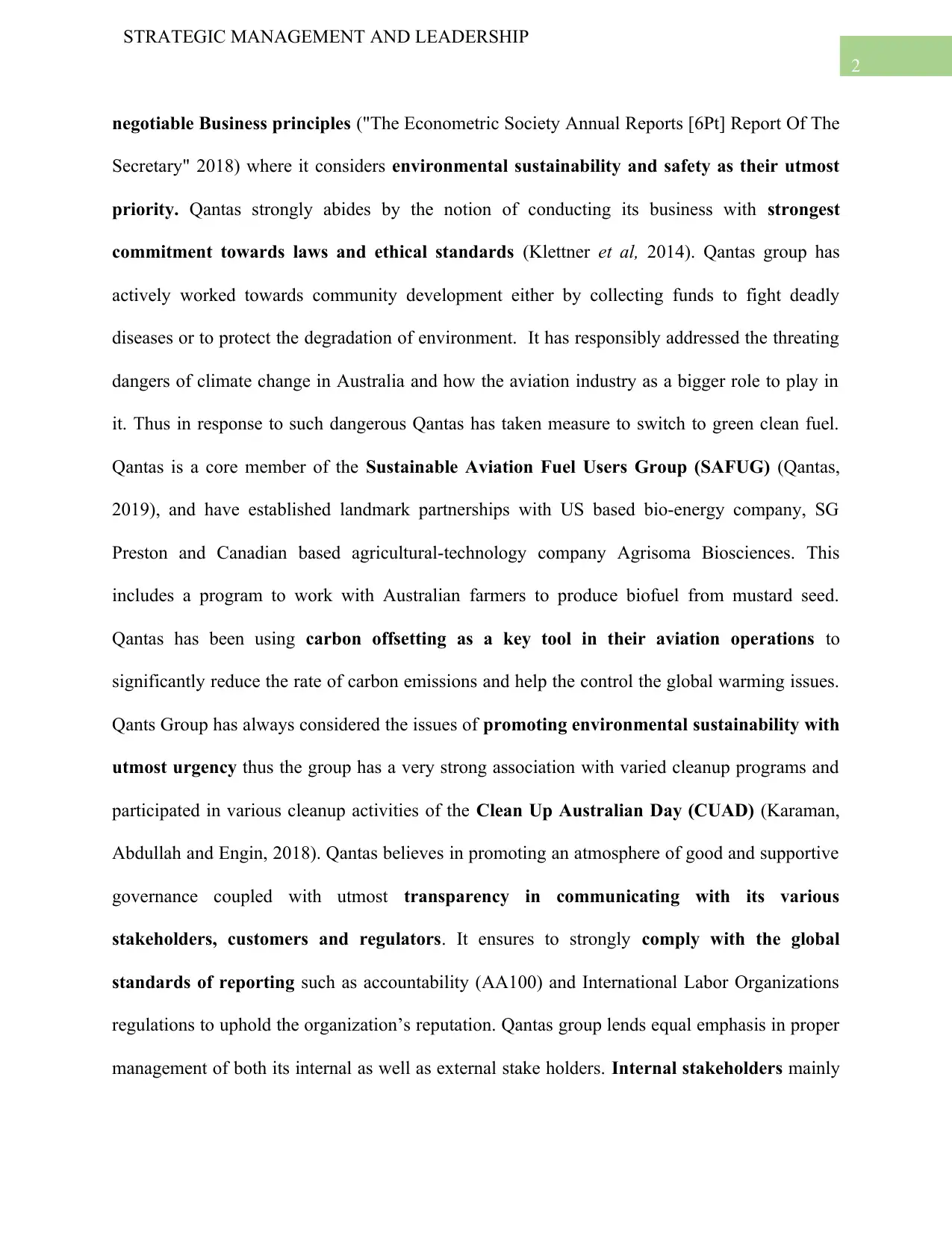
2
STRATEGIC MANAGEMENT AND LEADERSHIP
negotiable Business principles ("The Econometric Society Annual Reports [6Pt] Report Of The
Secretary" 2018) where it considers environmental sustainability and safety as their utmost
priority. Qantas strongly abides by the notion of conducting its business with strongest
commitment towards laws and ethical standards (Klettner et al, 2014). Qantas group has
actively worked towards community development either by collecting funds to fight deadly
diseases or to protect the degradation of environment. It has responsibly addressed the threating
dangers of climate change in Australia and how the aviation industry as a bigger role to play in
it. Thus in response to such dangerous Qantas has taken measure to switch to green clean fuel.
Qantas is a core member of the Sustainable Aviation Fuel Users Group (SAFUG) (Qantas,
2019), and have established landmark partnerships with US based bio-energy company, SG
Preston and Canadian based agricultural-technology company Agrisoma Biosciences. This
includes a program to work with Australian farmers to produce biofuel from mustard seed.
Qantas has been using carbon offsetting as a key tool in their aviation operations to
significantly reduce the rate of carbon emissions and help the control the global warming issues.
Qants Group has always considered the issues of promoting environmental sustainability with
utmost urgency thus the group has a very strong association with varied cleanup programs and
participated in various cleanup activities of the Clean Up Australian Day (CUAD) (Karaman,
Abdullah and Engin, 2018). Qantas believes in promoting an atmosphere of good and supportive
governance coupled with utmost transparency in communicating with its various
stakeholders, customers and regulators. It ensures to strongly comply with the global
standards of reporting such as accountability (AA100) and International Labor Organizations
regulations to uphold the organization’s reputation. Qantas group lends equal emphasis in proper
management of both its internal as well as external stake holders. Internal stakeholders mainly
STRATEGIC MANAGEMENT AND LEADERSHIP
negotiable Business principles ("The Econometric Society Annual Reports [6Pt] Report Of The
Secretary" 2018) where it considers environmental sustainability and safety as their utmost
priority. Qantas strongly abides by the notion of conducting its business with strongest
commitment towards laws and ethical standards (Klettner et al, 2014). Qantas group has
actively worked towards community development either by collecting funds to fight deadly
diseases or to protect the degradation of environment. It has responsibly addressed the threating
dangers of climate change in Australia and how the aviation industry as a bigger role to play in
it. Thus in response to such dangerous Qantas has taken measure to switch to green clean fuel.
Qantas is a core member of the Sustainable Aviation Fuel Users Group (SAFUG) (Qantas,
2019), and have established landmark partnerships with US based bio-energy company, SG
Preston and Canadian based agricultural-technology company Agrisoma Biosciences. This
includes a program to work with Australian farmers to produce biofuel from mustard seed.
Qantas has been using carbon offsetting as a key tool in their aviation operations to
significantly reduce the rate of carbon emissions and help the control the global warming issues.
Qants Group has always considered the issues of promoting environmental sustainability with
utmost urgency thus the group has a very strong association with varied cleanup programs and
participated in various cleanup activities of the Clean Up Australian Day (CUAD) (Karaman,
Abdullah and Engin, 2018). Qantas believes in promoting an atmosphere of good and supportive
governance coupled with utmost transparency in communicating with its various
stakeholders, customers and regulators. It ensures to strongly comply with the global
standards of reporting such as accountability (AA100) and International Labor Organizations
regulations to uphold the organization’s reputation. Qantas group lends equal emphasis in proper
management of both its internal as well as external stake holders. Internal stakeholders mainly
⊘ This is a preview!⊘
Do you want full access?
Subscribe today to unlock all pages.

Trusted by 1+ million students worldwide
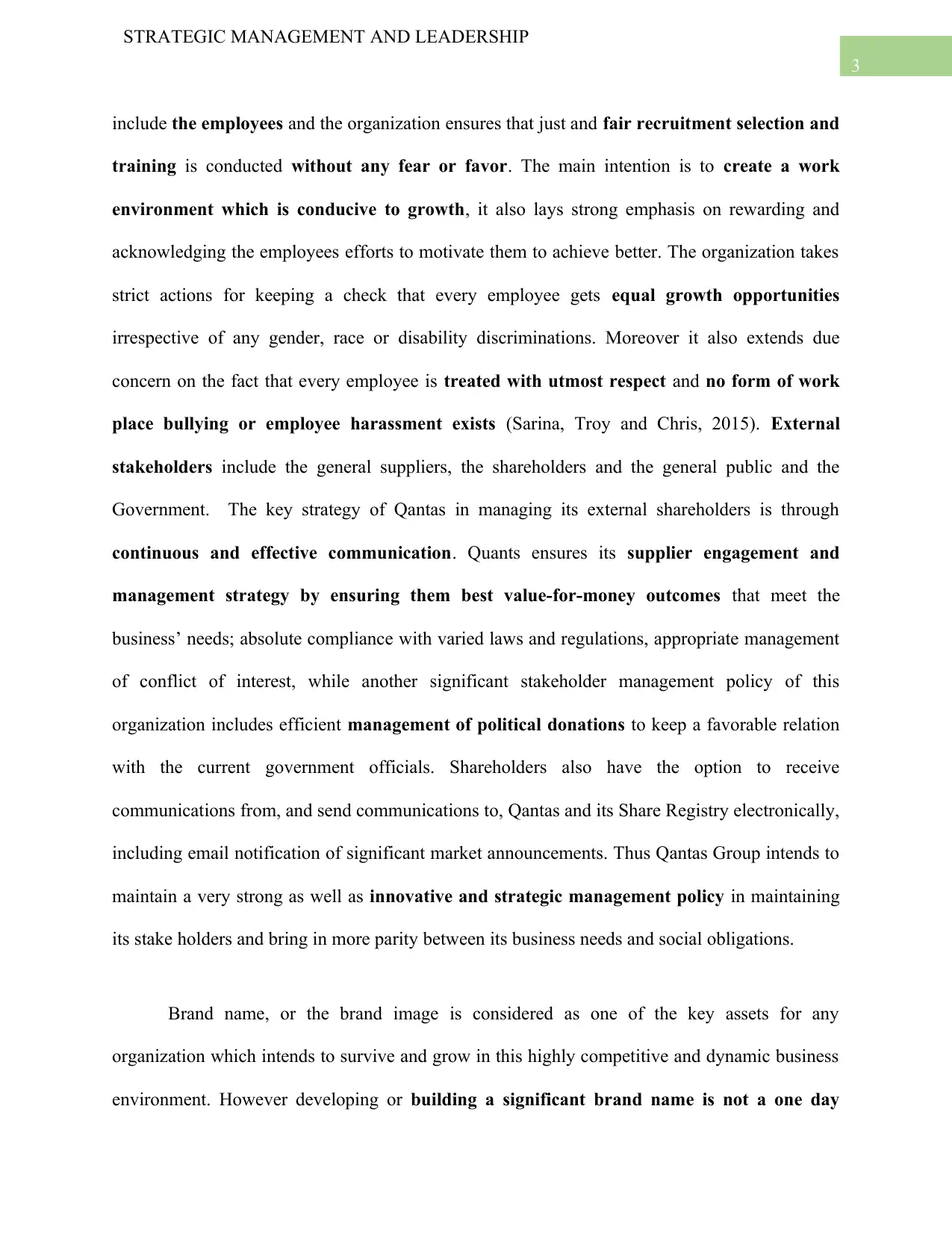
3
STRATEGIC MANAGEMENT AND LEADERSHIP
include the employees and the organization ensures that just and fair recruitment selection and
training is conducted without any fear or favor. The main intention is to create a work
environment which is conducive to growth, it also lays strong emphasis on rewarding and
acknowledging the employees efforts to motivate them to achieve better. The organization takes
strict actions for keeping a check that every employee gets equal growth opportunities
irrespective of any gender, race or disability discriminations. Moreover it also extends due
concern on the fact that every employee is treated with utmost respect and no form of work
place bullying or employee harassment exists (Sarina, Troy and Chris, 2015). External
stakeholders include the general suppliers, the shareholders and the general public and the
Government. The key strategy of Qantas in managing its external shareholders is through
continuous and effective communication. Quants ensures its supplier engagement and
management strategy by ensuring them best value-for-money outcomes that meet the
business’ needs; absolute compliance with varied laws and regulations, appropriate management
of conflict of interest, while another significant stakeholder management policy of this
organization includes efficient management of political donations to keep a favorable relation
with the current government officials. Shareholders also have the option to receive
communications from, and send communications to, Qantas and its Share Registry electronically,
including email notification of significant market announcements. Thus Qantas Group intends to
maintain a very strong as well as innovative and strategic management policy in maintaining
its stake holders and bring in more parity between its business needs and social obligations.
Brand name, or the brand image is considered as one of the key assets for any
organization which intends to survive and grow in this highly competitive and dynamic business
environment. However developing or building a significant brand name is not a one day
STRATEGIC MANAGEMENT AND LEADERSHIP
include the employees and the organization ensures that just and fair recruitment selection and
training is conducted without any fear or favor. The main intention is to create a work
environment which is conducive to growth, it also lays strong emphasis on rewarding and
acknowledging the employees efforts to motivate them to achieve better. The organization takes
strict actions for keeping a check that every employee gets equal growth opportunities
irrespective of any gender, race or disability discriminations. Moreover it also extends due
concern on the fact that every employee is treated with utmost respect and no form of work
place bullying or employee harassment exists (Sarina, Troy and Chris, 2015). External
stakeholders include the general suppliers, the shareholders and the general public and the
Government. The key strategy of Qantas in managing its external shareholders is through
continuous and effective communication. Quants ensures its supplier engagement and
management strategy by ensuring them best value-for-money outcomes that meet the
business’ needs; absolute compliance with varied laws and regulations, appropriate management
of conflict of interest, while another significant stakeholder management policy of this
organization includes efficient management of political donations to keep a favorable relation
with the current government officials. Shareholders also have the option to receive
communications from, and send communications to, Qantas and its Share Registry electronically,
including email notification of significant market announcements. Thus Qantas Group intends to
maintain a very strong as well as innovative and strategic management policy in maintaining
its stake holders and bring in more parity between its business needs and social obligations.
Brand name, or the brand image is considered as one of the key assets for any
organization which intends to survive and grow in this highly competitive and dynamic business
environment. However developing or building a significant brand name is not a one day
Paraphrase This Document
Need a fresh take? Get an instant paraphrase of this document with our AI Paraphraser
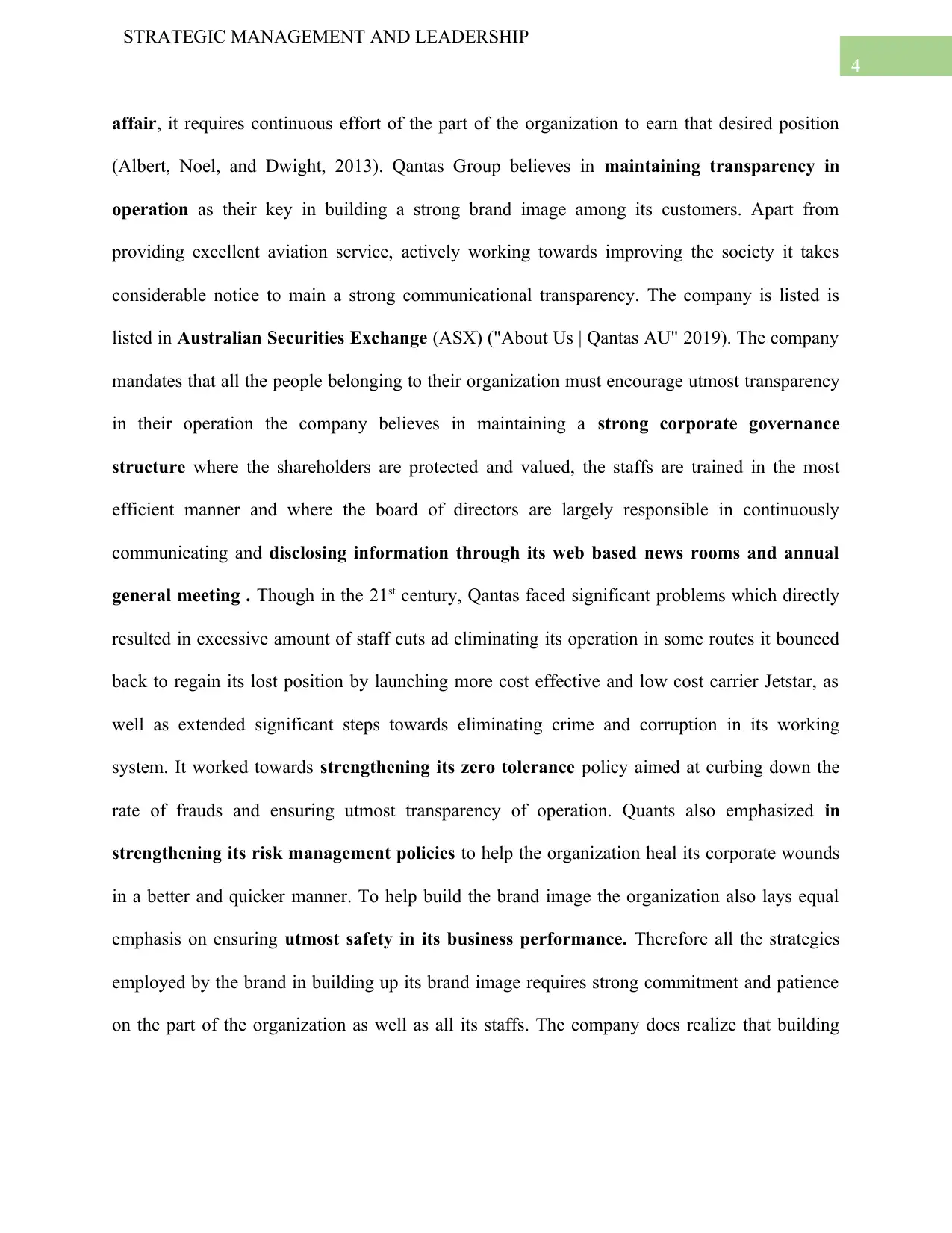
4
STRATEGIC MANAGEMENT AND LEADERSHIP
affair, it requires continuous effort of the part of the organization to earn that desired position
(Albert, Noel, and Dwight, 2013). Qantas Group believes in maintaining transparency in
operation as their key in building a strong brand image among its customers. Apart from
providing excellent aviation service, actively working towards improving the society it takes
considerable notice to main a strong communicational transparency. The company is listed is
listed in Australian Securities Exchange (ASX) ("About Us | Qantas AU" 2019). The company
mandates that all the people belonging to their organization must encourage utmost transparency
in their operation the company believes in maintaining a strong corporate governance
structure where the shareholders are protected and valued, the staffs are trained in the most
efficient manner and where the board of directors are largely responsible in continuously
communicating and disclosing information through its web based news rooms and annual
general meeting . Though in the 21st century, Qantas faced significant problems which directly
resulted in excessive amount of staff cuts ad eliminating its operation in some routes it bounced
back to regain its lost position by launching more cost effective and low cost carrier Jetstar, as
well as extended significant steps towards eliminating crime and corruption in its working
system. It worked towards strengthening its zero tolerance policy aimed at curbing down the
rate of frauds and ensuring utmost transparency of operation. Quants also emphasized in
strengthening its risk management policies to help the organization heal its corporate wounds
in a better and quicker manner. To help build the brand image the organization also lays equal
emphasis on ensuring utmost safety in its business performance. Therefore all the strategies
employed by the brand in building up its brand image requires strong commitment and patience
on the part of the organization as well as all its staffs. The company does realize that building
STRATEGIC MANAGEMENT AND LEADERSHIP
affair, it requires continuous effort of the part of the organization to earn that desired position
(Albert, Noel, and Dwight, 2013). Qantas Group believes in maintaining transparency in
operation as their key in building a strong brand image among its customers. Apart from
providing excellent aviation service, actively working towards improving the society it takes
considerable notice to main a strong communicational transparency. The company is listed is
listed in Australian Securities Exchange (ASX) ("About Us | Qantas AU" 2019). The company
mandates that all the people belonging to their organization must encourage utmost transparency
in their operation the company believes in maintaining a strong corporate governance
structure where the shareholders are protected and valued, the staffs are trained in the most
efficient manner and where the board of directors are largely responsible in continuously
communicating and disclosing information through its web based news rooms and annual
general meeting . Though in the 21st century, Qantas faced significant problems which directly
resulted in excessive amount of staff cuts ad eliminating its operation in some routes it bounced
back to regain its lost position by launching more cost effective and low cost carrier Jetstar, as
well as extended significant steps towards eliminating crime and corruption in its working
system. It worked towards strengthening its zero tolerance policy aimed at curbing down the
rate of frauds and ensuring utmost transparency of operation. Quants also emphasized in
strengthening its risk management policies to help the organization heal its corporate wounds
in a better and quicker manner. To help build the brand image the organization also lays equal
emphasis on ensuring utmost safety in its business performance. Therefore all the strategies
employed by the brand in building up its brand image requires strong commitment and patience
on the part of the organization as well as all its staffs. The company does realize that building
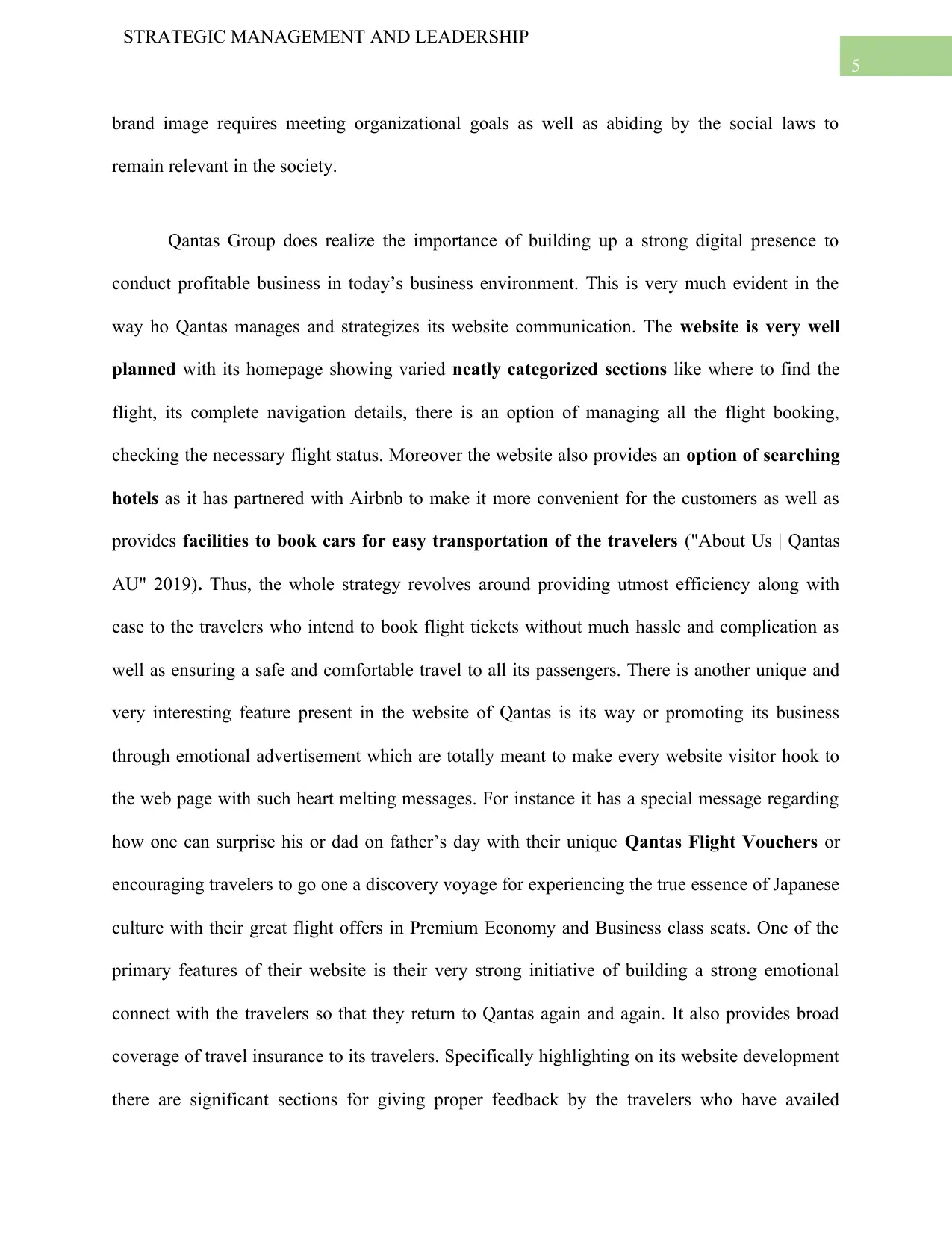
5
STRATEGIC MANAGEMENT AND LEADERSHIP
brand image requires meeting organizational goals as well as abiding by the social laws to
remain relevant in the society.
Qantas Group does realize the importance of building up a strong digital presence to
conduct profitable business in today’s business environment. This is very much evident in the
way ho Qantas manages and strategizes its website communication. The website is very well
planned with its homepage showing varied neatly categorized sections like where to find the
flight, its complete navigation details, there is an option of managing all the flight booking,
checking the necessary flight status. Moreover the website also provides an option of searching
hotels as it has partnered with Airbnb to make it more convenient for the customers as well as
provides facilities to book cars for easy transportation of the travelers ("About Us | Qantas
AU" 2019). Thus, the whole strategy revolves around providing utmost efficiency along with
ease to the travelers who intend to book flight tickets without much hassle and complication as
well as ensuring a safe and comfortable travel to all its passengers. There is another unique and
very interesting feature present in the website of Qantas is its way or promoting its business
through emotional advertisement which are totally meant to make every website visitor hook to
the web page with such heart melting messages. For instance it has a special message regarding
how one can surprise his or dad on father’s day with their unique Qantas Flight Vouchers or
encouraging travelers to go one a discovery voyage for experiencing the true essence of Japanese
culture with their great flight offers in Premium Economy and Business class seats. One of the
primary features of their website is their very strong initiative of building a strong emotional
connect with the travelers so that they return to Qantas again and again. It also provides broad
coverage of travel insurance to its travelers. Specifically highlighting on its website development
there are significant sections for giving proper feedback by the travelers who have availed
STRATEGIC MANAGEMENT AND LEADERSHIP
brand image requires meeting organizational goals as well as abiding by the social laws to
remain relevant in the society.
Qantas Group does realize the importance of building up a strong digital presence to
conduct profitable business in today’s business environment. This is very much evident in the
way ho Qantas manages and strategizes its website communication. The website is very well
planned with its homepage showing varied neatly categorized sections like where to find the
flight, its complete navigation details, there is an option of managing all the flight booking,
checking the necessary flight status. Moreover the website also provides an option of searching
hotels as it has partnered with Airbnb to make it more convenient for the customers as well as
provides facilities to book cars for easy transportation of the travelers ("About Us | Qantas
AU" 2019). Thus, the whole strategy revolves around providing utmost efficiency along with
ease to the travelers who intend to book flight tickets without much hassle and complication as
well as ensuring a safe and comfortable travel to all its passengers. There is another unique and
very interesting feature present in the website of Qantas is its way or promoting its business
through emotional advertisement which are totally meant to make every website visitor hook to
the web page with such heart melting messages. For instance it has a special message regarding
how one can surprise his or dad on father’s day with their unique Qantas Flight Vouchers or
encouraging travelers to go one a discovery voyage for experiencing the true essence of Japanese
culture with their great flight offers in Premium Economy and Business class seats. One of the
primary features of their website is their very strong initiative of building a strong emotional
connect with the travelers so that they return to Qantas again and again. It also provides broad
coverage of travel insurance to its travelers. Specifically highlighting on its website development
there are significant sections for giving proper feedback by the travelers who have availed
⊘ This is a preview!⊘
Do you want full access?
Subscribe today to unlock all pages.

Trusted by 1+ million students worldwide
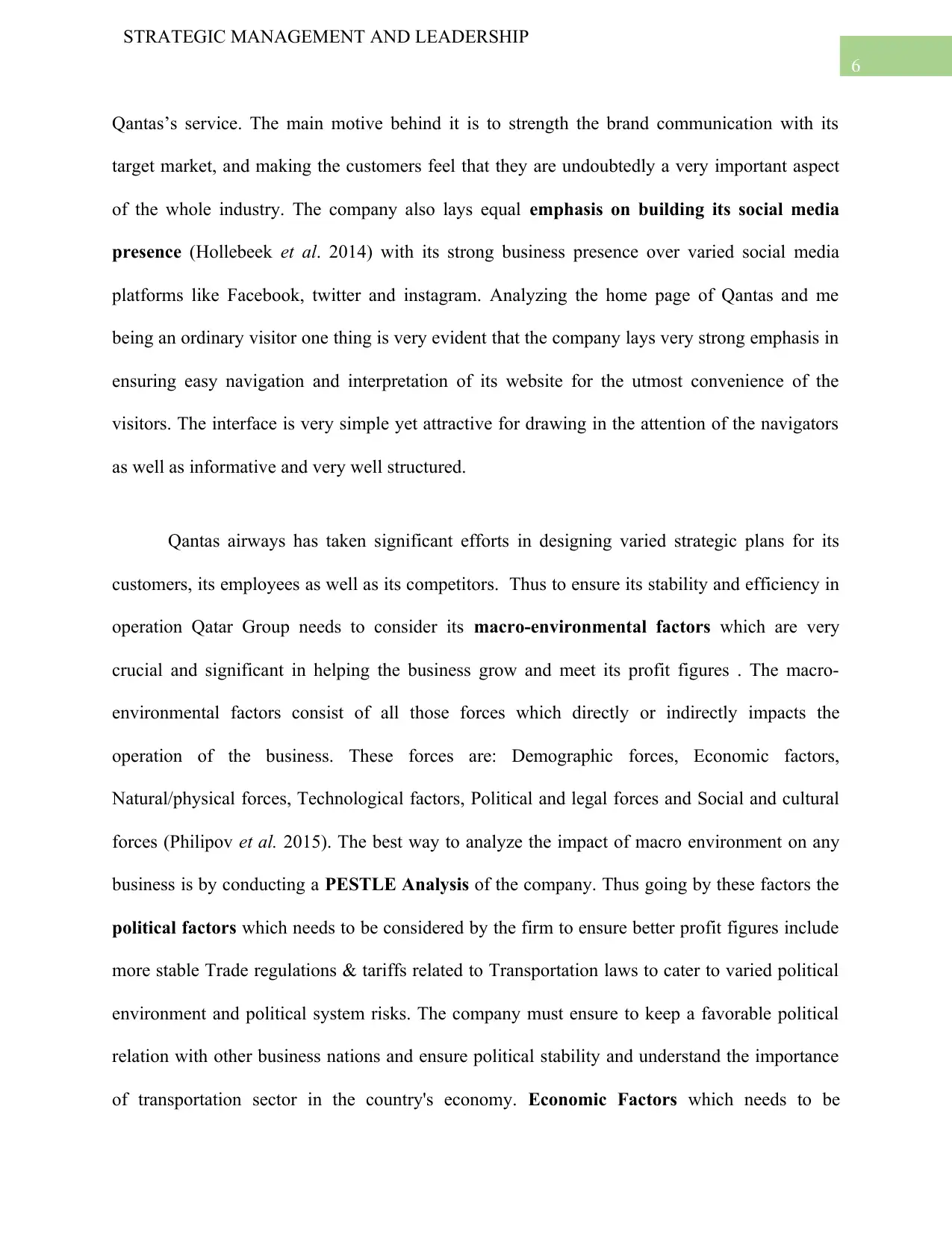
6
STRATEGIC MANAGEMENT AND LEADERSHIP
Qantas’s service. The main motive behind it is to strength the brand communication with its
target market, and making the customers feel that they are undoubtedly a very important aspect
of the whole industry. The company also lays equal emphasis on building its social media
presence (Hollebeek et al. 2014) with its strong business presence over varied social media
platforms like Facebook, twitter and instagram. Analyzing the home page of Qantas and me
being an ordinary visitor one thing is very evident that the company lays very strong emphasis in
ensuring easy navigation and interpretation of its website for the utmost convenience of the
visitors. The interface is very simple yet attractive for drawing in the attention of the navigators
as well as informative and very well structured.
Qantas airways has taken significant efforts in designing varied strategic plans for its
customers, its employees as well as its competitors. Thus to ensure its stability and efficiency in
operation Qatar Group needs to consider its macro-environmental factors which are very
crucial and significant in helping the business grow and meet its profit figures . The macro-
environmental factors consist of all those forces which directly or indirectly impacts the
operation of the business. These forces are: Demographic forces, Economic factors,
Natural/physical forces, Technological factors, Political and legal forces and Social and cultural
forces (Philipov et al. 2015). The best way to analyze the impact of macro environment on any
business is by conducting a PESTLE Analysis of the company. Thus going by these factors the
political factors which needs to be considered by the firm to ensure better profit figures include
more stable Trade regulations & tariffs related to Transportation laws to cater to varied political
environment and political system risks. The company must ensure to keep a favorable political
relation with other business nations and ensure political stability and understand the importance
of transportation sector in the country's economy. Economic Factors which needs to be
STRATEGIC MANAGEMENT AND LEADERSHIP
Qantas’s service. The main motive behind it is to strength the brand communication with its
target market, and making the customers feel that they are undoubtedly a very important aspect
of the whole industry. The company also lays equal emphasis on building its social media
presence (Hollebeek et al. 2014) with its strong business presence over varied social media
platforms like Facebook, twitter and instagram. Analyzing the home page of Qantas and me
being an ordinary visitor one thing is very evident that the company lays very strong emphasis in
ensuring easy navigation and interpretation of its website for the utmost convenience of the
visitors. The interface is very simple yet attractive for drawing in the attention of the navigators
as well as informative and very well structured.
Qantas airways has taken significant efforts in designing varied strategic plans for its
customers, its employees as well as its competitors. Thus to ensure its stability and efficiency in
operation Qatar Group needs to consider its macro-environmental factors which are very
crucial and significant in helping the business grow and meet its profit figures . The macro-
environmental factors consist of all those forces which directly or indirectly impacts the
operation of the business. These forces are: Demographic forces, Economic factors,
Natural/physical forces, Technological factors, Political and legal forces and Social and cultural
forces (Philipov et al. 2015). The best way to analyze the impact of macro environment on any
business is by conducting a PESTLE Analysis of the company. Thus going by these factors the
political factors which needs to be considered by the firm to ensure better profit figures include
more stable Trade regulations & tariffs related to Transportation laws to cater to varied political
environment and political system risks. The company must ensure to keep a favorable political
relation with other business nations and ensure political stability and understand the importance
of transportation sector in the country's economy. Economic Factors which needs to be
Paraphrase This Document
Need a fresh take? Get an instant paraphrase of this document with our AI Paraphraser
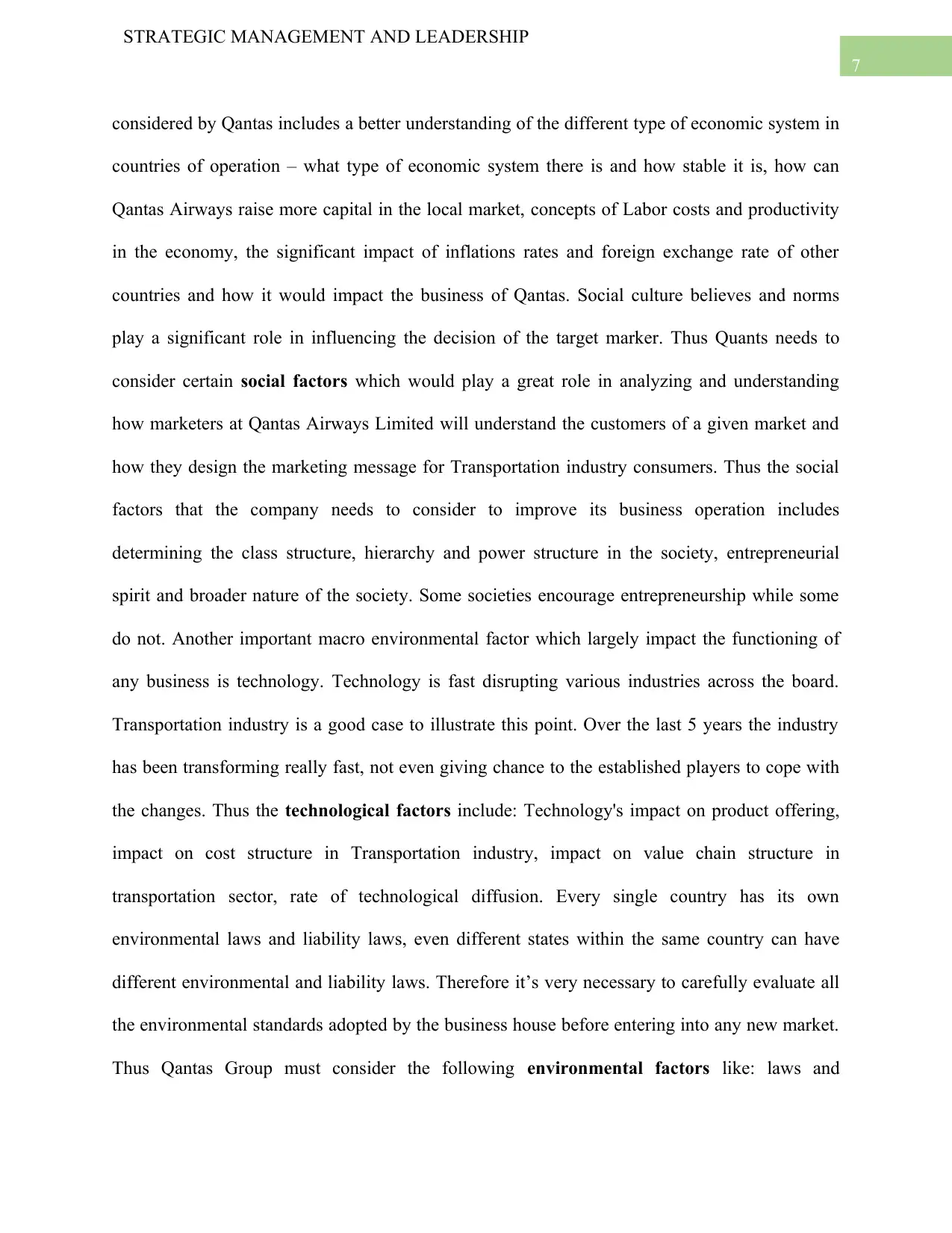
7
STRATEGIC MANAGEMENT AND LEADERSHIP
considered by Qantas includes a better understanding of the different type of economic system in
countries of operation – what type of economic system there is and how stable it is, how can
Qantas Airways raise more capital in the local market, concepts of Labor costs and productivity
in the economy, the significant impact of inflations rates and foreign exchange rate of other
countries and how it would impact the business of Qantas. Social culture believes and norms
play a significant role in influencing the decision of the target marker. Thus Quants needs to
consider certain social factors which would play a great role in analyzing and understanding
how marketers at Qantas Airways Limited will understand the customers of a given market and
how they design the marketing message for Transportation industry consumers. Thus the social
factors that the company needs to consider to improve its business operation includes
determining the class structure, hierarchy and power structure in the society, entrepreneurial
spirit and broader nature of the society. Some societies encourage entrepreneurship while some
do not. Another important macro environmental factor which largely impact the functioning of
any business is technology. Technology is fast disrupting various industries across the board.
Transportation industry is a good case to illustrate this point. Over the last 5 years the industry
has been transforming really fast, not even giving chance to the established players to cope with
the changes. Thus the technological factors include: Technology's impact on product offering,
impact on cost structure in Transportation industry, impact on value chain structure in
transportation sector, rate of technological diffusion. Every single country has its own
environmental laws and liability laws, even different states within the same country can have
different environmental and liability laws. Therefore it’s very necessary to carefully evaluate all
the environmental standards adopted by the business house before entering into any new market.
Thus Qantas Group must consider the following environmental factors like: laws and
STRATEGIC MANAGEMENT AND LEADERSHIP
considered by Qantas includes a better understanding of the different type of economic system in
countries of operation – what type of economic system there is and how stable it is, how can
Qantas Airways raise more capital in the local market, concepts of Labor costs and productivity
in the economy, the significant impact of inflations rates and foreign exchange rate of other
countries and how it would impact the business of Qantas. Social culture believes and norms
play a significant role in influencing the decision of the target marker. Thus Quants needs to
consider certain social factors which would play a great role in analyzing and understanding
how marketers at Qantas Airways Limited will understand the customers of a given market and
how they design the marketing message for Transportation industry consumers. Thus the social
factors that the company needs to consider to improve its business operation includes
determining the class structure, hierarchy and power structure in the society, entrepreneurial
spirit and broader nature of the society. Some societies encourage entrepreneurship while some
do not. Another important macro environmental factor which largely impact the functioning of
any business is technology. Technology is fast disrupting various industries across the board.
Transportation industry is a good case to illustrate this point. Over the last 5 years the industry
has been transforming really fast, not even giving chance to the established players to cope with
the changes. Thus the technological factors include: Technology's impact on product offering,
impact on cost structure in Transportation industry, impact on value chain structure in
transportation sector, rate of technological diffusion. Every single country has its own
environmental laws and liability laws, even different states within the same country can have
different environmental and liability laws. Therefore it’s very necessary to carefully evaluate all
the environmental standards adopted by the business house before entering into any new market.
Thus Qantas Group must consider the following environmental factors like: laws and
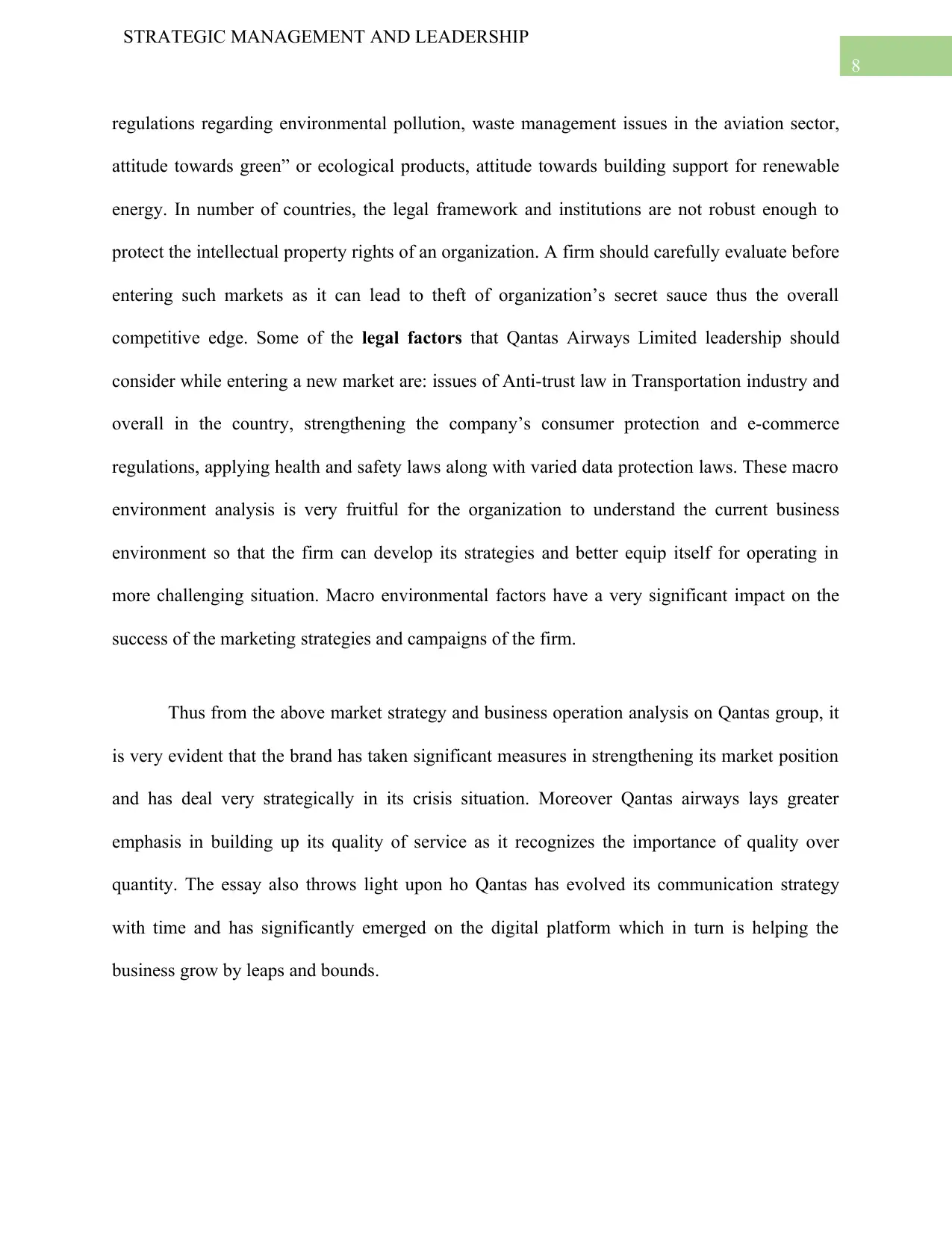
8
STRATEGIC MANAGEMENT AND LEADERSHIP
regulations regarding environmental pollution, waste management issues in the aviation sector,
attitude towards green” or ecological products, attitude towards building support for renewable
energy. In number of countries, the legal framework and institutions are not robust enough to
protect the intellectual property rights of an organization. A firm should carefully evaluate before
entering such markets as it can lead to theft of organization’s secret sauce thus the overall
competitive edge. Some of the legal factors that Qantas Airways Limited leadership should
consider while entering a new market are: issues of Anti-trust law in Transportation industry and
overall in the country, strengthening the company’s consumer protection and e-commerce
regulations, applying health and safety laws along with varied data protection laws. These macro
environment analysis is very fruitful for the organization to understand the current business
environment so that the firm can develop its strategies and better equip itself for operating in
more challenging situation. Macro environmental factors have a very significant impact on the
success of the marketing strategies and campaigns of the firm.
Thus from the above market strategy and business operation analysis on Qantas group, it
is very evident that the brand has taken significant measures in strengthening its market position
and has deal very strategically in its crisis situation. Moreover Qantas airways lays greater
emphasis in building up its quality of service as it recognizes the importance of quality over
quantity. The essay also throws light upon ho Qantas has evolved its communication strategy
with time and has significantly emerged on the digital platform which in turn is helping the
business grow by leaps and bounds.
STRATEGIC MANAGEMENT AND LEADERSHIP
regulations regarding environmental pollution, waste management issues in the aviation sector,
attitude towards green” or ecological products, attitude towards building support for renewable
energy. In number of countries, the legal framework and institutions are not robust enough to
protect the intellectual property rights of an organization. A firm should carefully evaluate before
entering such markets as it can lead to theft of organization’s secret sauce thus the overall
competitive edge. Some of the legal factors that Qantas Airways Limited leadership should
consider while entering a new market are: issues of Anti-trust law in Transportation industry and
overall in the country, strengthening the company’s consumer protection and e-commerce
regulations, applying health and safety laws along with varied data protection laws. These macro
environment analysis is very fruitful for the organization to understand the current business
environment so that the firm can develop its strategies and better equip itself for operating in
more challenging situation. Macro environmental factors have a very significant impact on the
success of the marketing strategies and campaigns of the firm.
Thus from the above market strategy and business operation analysis on Qantas group, it
is very evident that the brand has taken significant measures in strengthening its market position
and has deal very strategically in its crisis situation. Moreover Qantas airways lays greater
emphasis in building up its quality of service as it recognizes the importance of quality over
quantity. The essay also throws light upon ho Qantas has evolved its communication strategy
with time and has significantly emerged on the digital platform which in turn is helping the
business grow by leaps and bounds.
⊘ This is a preview!⊘
Do you want full access?
Subscribe today to unlock all pages.

Trusted by 1+ million students worldwide
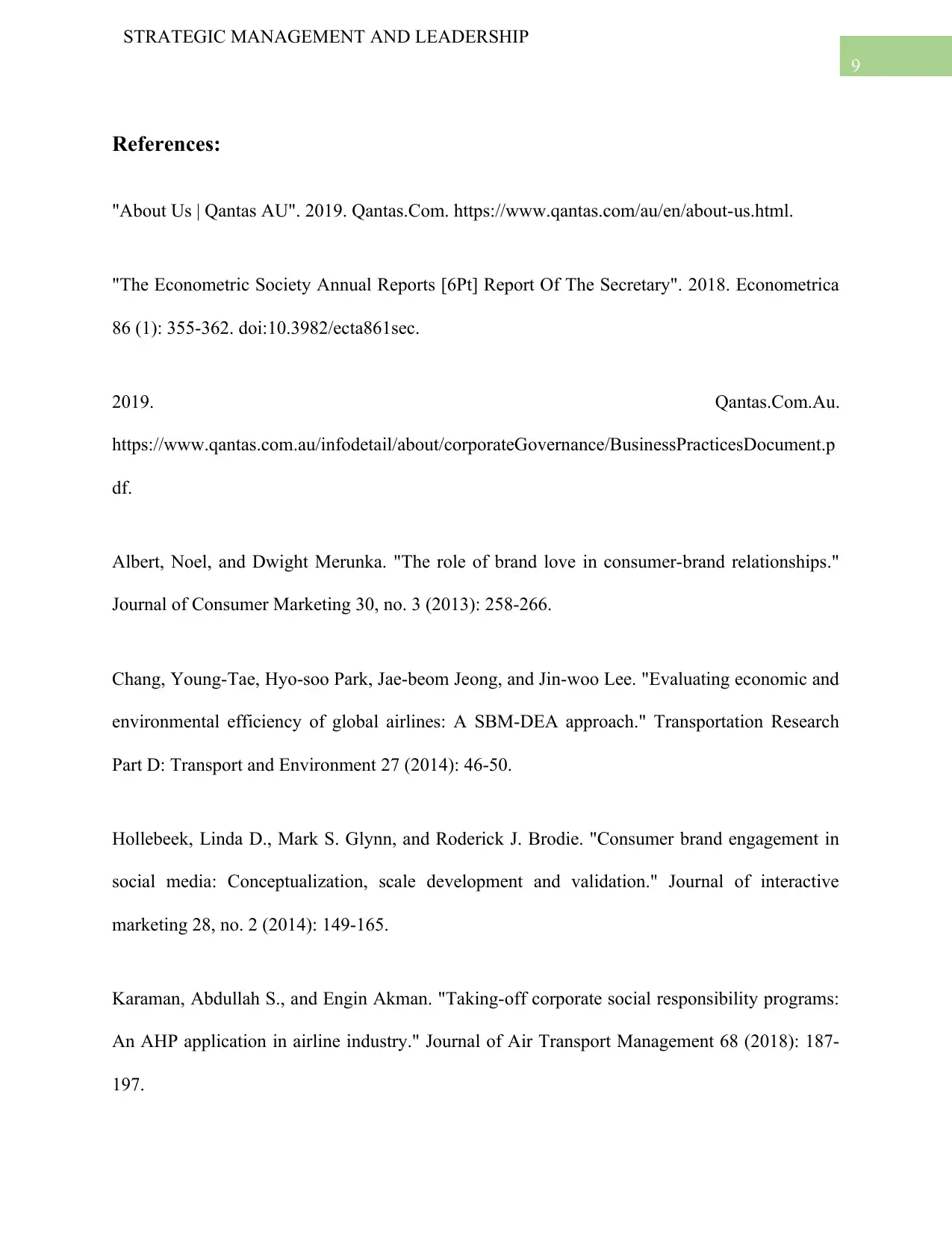
9
STRATEGIC MANAGEMENT AND LEADERSHIP
References:
"About Us | Qantas AU". 2019. Qantas.Com. https://www.qantas.com/au/en/about-us.html.
"The Econometric Society Annual Reports [6Pt] Report Of The Secretary". 2018. Econometrica
86 (1): 355-362. doi:10.3982/ecta861sec.
2019. Qantas.Com.Au.
https://www.qantas.com.au/infodetail/about/corporateGovernance/BusinessPracticesDocument.p
df.
Albert, Noel, and Dwight Merunka. "The role of brand love in consumer-brand relationships."
Journal of Consumer Marketing 30, no. 3 (2013): 258-266.
Chang, Young-Tae, Hyo-soo Park, Jae-beom Jeong, and Jin-woo Lee. "Evaluating economic and
environmental efficiency of global airlines: A SBM-DEA approach." Transportation Research
Part D: Transport and Environment 27 (2014): 46-50.
Hollebeek, Linda D., Mark S. Glynn, and Roderick J. Brodie. "Consumer brand engagement in
social media: Conceptualization, scale development and validation." Journal of interactive
marketing 28, no. 2 (2014): 149-165.
Karaman, Abdullah S., and Engin Akman. "Taking-off corporate social responsibility programs:
An AHP application in airline industry." Journal of Air Transport Management 68 (2018): 187-
197.
STRATEGIC MANAGEMENT AND LEADERSHIP
References:
"About Us | Qantas AU". 2019. Qantas.Com. https://www.qantas.com/au/en/about-us.html.
"The Econometric Society Annual Reports [6Pt] Report Of The Secretary". 2018. Econometrica
86 (1): 355-362. doi:10.3982/ecta861sec.
2019. Qantas.Com.Au.
https://www.qantas.com.au/infodetail/about/corporateGovernance/BusinessPracticesDocument.p
df.
Albert, Noel, and Dwight Merunka. "The role of brand love in consumer-brand relationships."
Journal of Consumer Marketing 30, no. 3 (2013): 258-266.
Chang, Young-Tae, Hyo-soo Park, Jae-beom Jeong, and Jin-woo Lee. "Evaluating economic and
environmental efficiency of global airlines: A SBM-DEA approach." Transportation Research
Part D: Transport and Environment 27 (2014): 46-50.
Hollebeek, Linda D., Mark S. Glynn, and Roderick J. Brodie. "Consumer brand engagement in
social media: Conceptualization, scale development and validation." Journal of interactive
marketing 28, no. 2 (2014): 149-165.
Karaman, Abdullah S., and Engin Akman. "Taking-off corporate social responsibility programs:
An AHP application in airline industry." Journal of Air Transport Management 68 (2018): 187-
197.
Paraphrase This Document
Need a fresh take? Get an instant paraphrase of this document with our AI Paraphraser
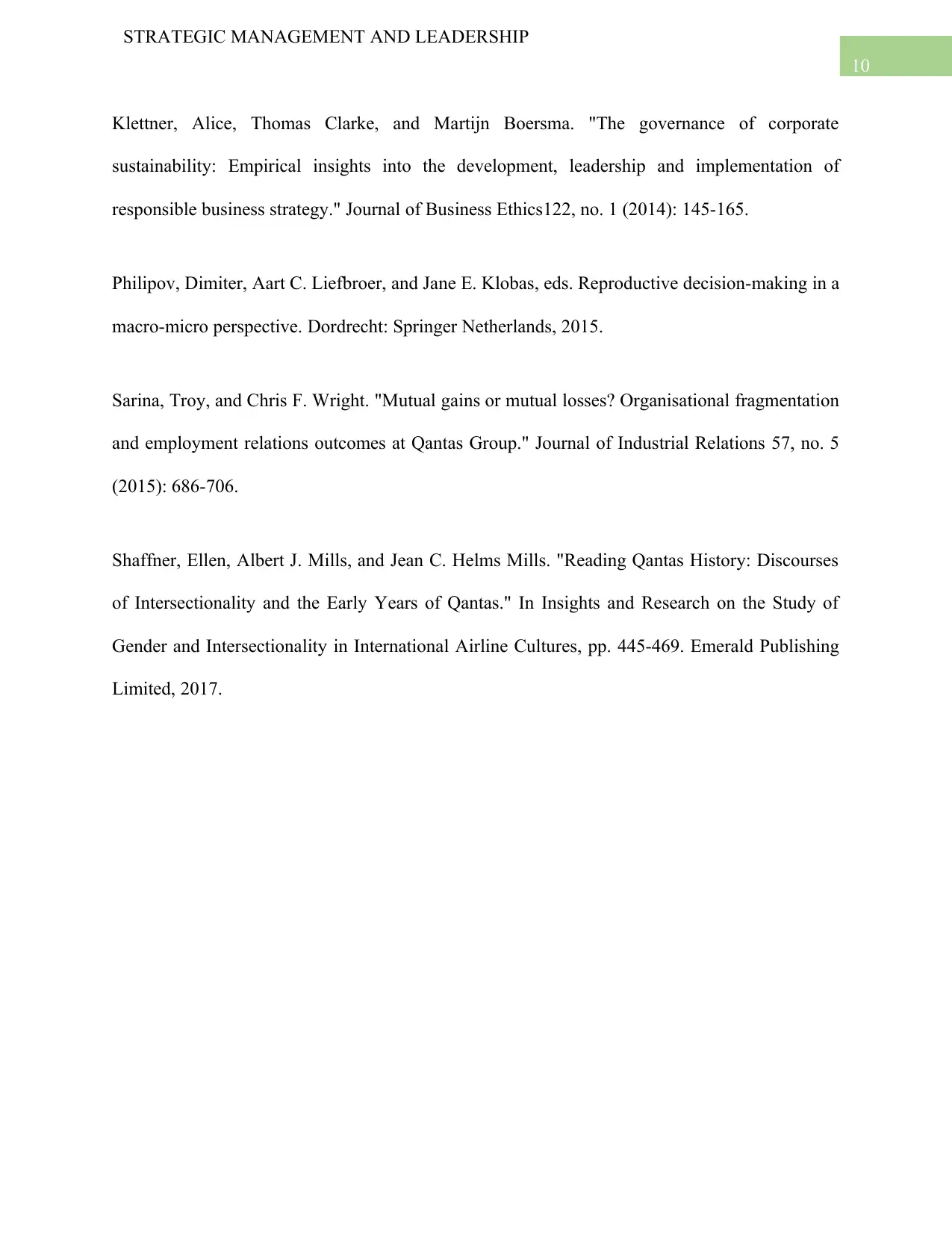
10
STRATEGIC MANAGEMENT AND LEADERSHIP
Klettner, Alice, Thomas Clarke, and Martijn Boersma. "The governance of corporate
sustainability: Empirical insights into the development, leadership and implementation of
responsible business strategy." Journal of Business Ethics122, no. 1 (2014): 145-165.
Philipov, Dimiter, Aart C. Liefbroer, and Jane E. Klobas, eds. Reproductive decision-making in a
macro-micro perspective. Dordrecht: Springer Netherlands, 2015.
Sarina, Troy, and Chris F. Wright. "Mutual gains or mutual losses? Organisational fragmentation
and employment relations outcomes at Qantas Group." Journal of Industrial Relations 57, no. 5
(2015): 686-706.
Shaffner, Ellen, Albert J. Mills, and Jean C. Helms Mills. "Reading Qantas History: Discourses
of Intersectionality and the Early Years of Qantas." In Insights and Research on the Study of
Gender and Intersectionality in International Airline Cultures, pp. 445-469. Emerald Publishing
Limited, 2017.
STRATEGIC MANAGEMENT AND LEADERSHIP
Klettner, Alice, Thomas Clarke, and Martijn Boersma. "The governance of corporate
sustainability: Empirical insights into the development, leadership and implementation of
responsible business strategy." Journal of Business Ethics122, no. 1 (2014): 145-165.
Philipov, Dimiter, Aart C. Liefbroer, and Jane E. Klobas, eds. Reproductive decision-making in a
macro-micro perspective. Dordrecht: Springer Netherlands, 2015.
Sarina, Troy, and Chris F. Wright. "Mutual gains or mutual losses? Organisational fragmentation
and employment relations outcomes at Qantas Group." Journal of Industrial Relations 57, no. 5
(2015): 686-706.
Shaffner, Ellen, Albert J. Mills, and Jean C. Helms Mills. "Reading Qantas History: Discourses
of Intersectionality and the Early Years of Qantas." In Insights and Research on the Study of
Gender and Intersectionality in International Airline Cultures, pp. 445-469. Emerald Publishing
Limited, 2017.
1 out of 11
Related Documents
Your All-in-One AI-Powered Toolkit for Academic Success.
+13062052269
info@desklib.com
Available 24*7 on WhatsApp / Email
![[object Object]](/_next/static/media/star-bottom.7253800d.svg)
Unlock your academic potential
Copyright © 2020–2026 A2Z Services. All Rights Reserved. Developed and managed by ZUCOL.





